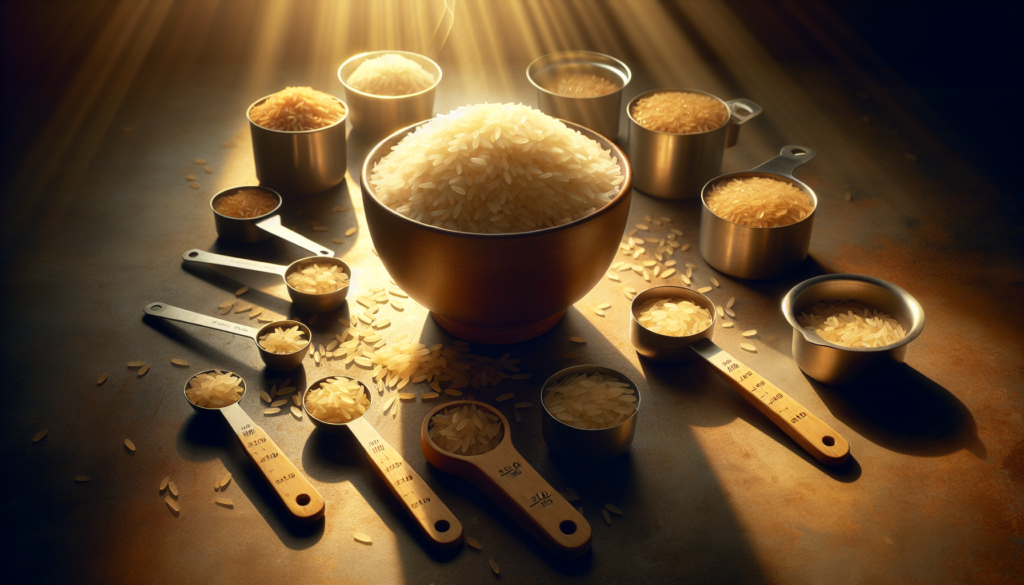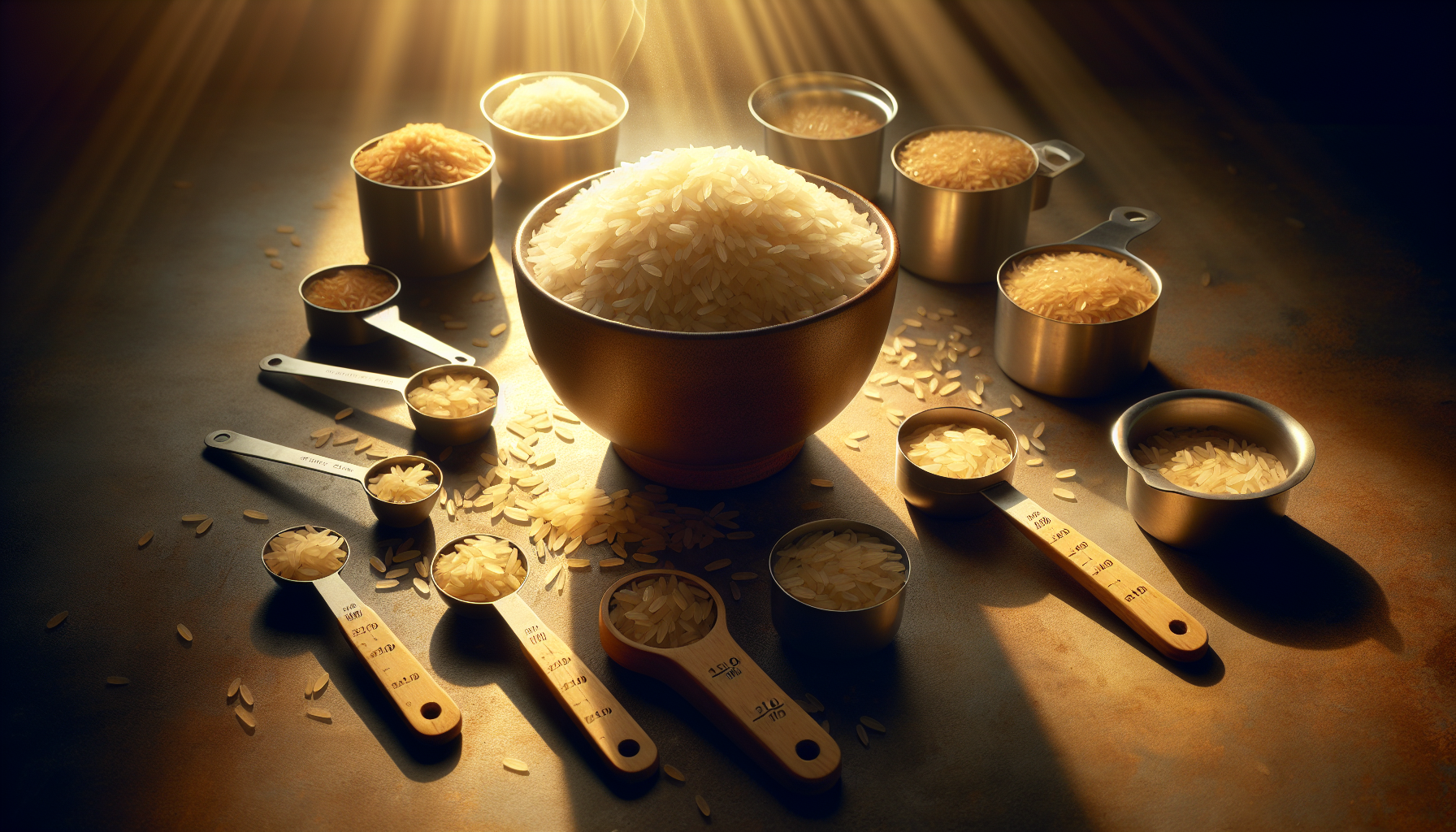Are you often left with either too little or too much rice after cooking? If so, we are here to help you find the perfect ratio of rice to cook per person. Whether you are cooking for yourself or a large gathering, it’s essential to get the portions just right. In this article, we will explore the factors you need to consider and provide you with an easy-to-follow guide to ensure you never have to worry about rice portions again.

Factors to Consider
Appetite
When determining how much rice to cook per person, one important factor to consider is appetite. Some individuals have larger appetites and may require a larger portion of rice, while others may only need a small serving. Take into account the overall hunger level of your guests or family members when deciding on the quantity of rice to prepare.
Type of Rice
The type of rice you choose can also impact the amount you should cook per person. Different varieties of rice have varying levels of water absorption and expansion when cooked. For example, long-grain rice such as basmati or jasmine rice generally expands less than short-grain rice like sushi rice. Keep this in mind when measuring out the rice to ensure you cook an appropriate amount.
Accompaniments
Considering the accompaniments you plan to serve alongside the rice is crucial. If you’re serving a hearty dish with plenty of other components, such as a curry or stir-fry, then you may want to allocate a slightly smaller portion of rice per person. On the other hand, if the rice is intended to be the main component of the meal, you may want to increase the serving size.
Leftovers
It’s always a good idea to take leftovers into account when determining the quantity of rice to cook. Rice can be easily stored and reheated for later use, making it a versatile ingredient. If you enjoy having leftovers or plan to use the rice for other meals throughout the week, it may be wise to cook a larger batch than strictly necessary for the current meal.
Standard Serving Size
Recommended Portion
The standard serving size for cooked rice is typically around 1/2 to 1 cup per person. This portion size allows for a satisfying amount of rice without overwhelming the other components of the meal. However, keep in mind that individual preferences and appetites may vary, so it’s essential to adjust the serving size accordingly.
Variations
While the recommended portion of rice per person is helpful as a guideline, it’s essential to consider the individuals you are serving. Some people may prefer larger portions of rice, while others may be content with less. Be sure to take into account any dietary restrictions or preferences as well. It’s always better to have a little extra rice than not enough, as leftovers can always be used for other delicious dishes.
Measuring Rice
Measuring Cups
Using measuring cups is the most common and convenient way to measure rice accurately. The general rule of thumb is that 1 cup of uncooked rice will yield approximately 3 cups of cooked rice. This ratio can help you determine the amount of raw rice needed per person, based on the standard serving size mentioned earlier.
Water Ratio
When measuring rice, it’s important to consider the water ratio as well. Different rice varieties require different amounts of water. Typically, the ratio is 1 part rice to 2 parts water. However, it’s always a good idea to refer to the specific cooking instructions on the rice packaging to ensure the perfect texture and consistency of the cooked rice.
Calculating Quantity
Using the Standard Serving Size
To calculate the quantity of rice needed, start by determining the number of servings required. Multiply this number by the recommended portion size, which is typically 1/2 to 1 cup per person. For example, if you are cooking for 6 people and the recommended portion size is 1 cup, you would need 6 cups of cooked rice.
Estimating by Weight
Another way to calculate the quantity of rice needed is by estimating the weight. On average, 1 cup of uncooked rice weighs around 6 to 8 ounces. Multiply the number of servings by the weight per serving to determine the total weight of rice required. This method is particularly useful if you have a kitchen scale to measure the ingredients accurately.
Using Online Calculators
For precise calculations or if you prefer a more convenient approach, there are various online rice calculators available. These calculators allow you to input the number of servings you need, and they will provide you with the exact measurements of rice and water required. This can be especially helpful when cooking for a large group or if you’re unsure about the portion sizes.
Serving Large Groups
Adjusting for Number of People
When serving a large group, it’s important to adjust the quantity of rice accordingly. Multiply the standard serving size by the number of people to determine the total amount of rice needed. It’s always better to have a slightly larger quantity than not enough, as you can store any leftovers or use them creatively in other dishes.
Considerations for Buffets
If you’re serving rice as part of a buffet-style meal, additional considerations come into play. Buffets often offer a wide array of dishes, so it’s common for individuals to take a smaller portion of each item. In this case, you may want to allocate less rice per person compared to a plated meal where individual servings are pre-portioned.
Cooking Techniques
Stovetop Method
The stovetop method is the traditional way of cooking rice and works well for small to moderate quantities. To cook rice on the stovetop, measure the desired amount of rice and water according to the rice-to-water ratio specified for the chosen rice variety. Bring the water to a boil, add the rice, reduce the heat to low, cover, and let it simmer for the recommended cooking time. Fluff the rice with a fork before serving.
Rice Cooker Method
Using a rice cooker is a convenient and foolproof way to cook rice, especially when cooking larger quantities. Simply measure the rice and water according to the rice cooker’s instructions, and let the machine do the rest. Rice cookers ensure consistent results and keep the rice warm until you’re ready to serve. They’re a time-saving option when cooking for a crowd or if you frequently prepare rice.
Tips for Perfect Rice
Rinsing the Rice
Rinsing the rice before cooking is an essential step to remove excess starch and any impurities. Place the rice in a fine-mesh sieve and rinse it under cold running water until the water runs clear. This step helps prevent the rice from becoming sticky and yields fluffy grains.
Salt and Seasonings
Adding a pinch of salt to the cooking water enhances the flavor of the rice. You can also infuse additional flavors by adding herbs, spices, or even a few aromatic vegetables like onion or garlic to the water. These seasonings will impart a subtle taste to the rice, making it more delightful to enjoy on its own or with accompanying dishes.
Resting Period
Allowing the cooked rice to rest for a few minutes before fluffing and serving is a crucial step to achieve the perfect texture. This resting period lets the moisture redistribute within the rice, resulting in uniformly cooked grains. It also improves the fluffiness and helps avoid a sticky or clumpy consistency.
Creative Rice Side Dishes
Fried Rice
Fried rice is a versatile and delicious way to use leftover rice. This dish involves stir-frying cooked rice with a mix of vegetables, protein, and seasonings. The key to great fried rice is using cold, day-old rice, as it has a drier texture that absorbs the flavors and prevents the dish from becoming mushy. Customize your fried rice with your favorite ingredients and sauces for a quick and satisfying meal.
Rice Pilaf
Rice pilaf is a flavorful and aromatic side dish that combines rice with vegetables, herbs, and spices. It’s an excellent accompaniment to various main courses and adds a touch of sophistication to any meal. The rice is typically sautéed in butter or oil before being simmered in broth or stock to infuse it with rich flavors. Experiment with different combinations of vegetables, nuts, and herbs to create your own signature rice pilaf.
Risotto
Risotto is a creamy and comforting rice dish that originates from Italy. Arborio or Carnaroli rice is traditionally used to make risotto due to its high starch content, which gives the dish its signature creaminess. The rice is slowly cooked by gradually adding hot broth or stock, stirring continuously until the liquid is absorbed. This process releases the starches and creates a velvety texture. You can elevate the flavor by adding ingredients like mushrooms, seafood, or cheese.
Using Leftover Rice
Storage Tips
If you have leftover rice, proper storage is crucial to maintain its quality. Allow the rice to cool to room temperature, and then transfer it to an airtight container. Store it in the refrigerator for up to 3-4 days, or in the freezer for up to 1 month. When freezing, it’s best to portion the rice into smaller containers or resealable bags to allow for easy reheating.
Reheating Ideas
Leftover rice can be transformed into various delicious dishes. One popular option is to reheat the rice in the microwave by sprinkling a few drops of water over it and covering it with a microwave-safe lid or wrap to retain moisture. Alternatively, you can revive the rice by stir-frying it with vegetables, protein, and your choice of seasonings, creating a quick and flavorful stir-fry.
Popular Rice Recipes
Chicken Biryani
Chicken biryani is a fragrant and flavorful rice dish that is popular in many countries. It combines basmati rice with marinated chicken, aromatic spices, and a variety of vegetables. The rice and chicken are cooked separately before being layered together in a pot and cooked further. The result is a mouth-watering one-pot meal that is perfect for gatherings or special occasions.
Vegetable Pulao
Vegetable pulao is a delightful rice dish that features a medley of vegetables cooked with fragrant spices and basmati rice. It’s a versatile recipe that allows for customization based on your preference and the ingredients you have on hand. The combination of spices and vegetables creates a colorful and flavorful dish that can be enjoyed as a standalone meal or as a side dish.
Mexican Rice
Mexican rice, also known as Spanish rice, is a savory and spicy side dish that pairs well with a variety of Mexican-inspired dishes. It typically consists of long-grain rice sautéed with onions, garlic, and tomatoes, then simmered in chicken or vegetable broth until tender. The vibrant flavors of cumin, chili powder, and jalapenos add a delicious kick to this popular rice dish.
Cooking the perfect amount of rice per person involves considering various factors such as appetite, the type of rice, accompaniments, and the potential for leftovers. To measure rice accurately, using measuring cups and following the appropriate water ratio is essential. Calculating the quantity can be done based on the standard serving size or estimated by weight, with the option of using online calculators for convenience. When serving large groups, adjusting for the number of people and considering buffet-style presentations are necessary. Cooking techniques include the stovetop and rice cooker methods, each with its own advantages. To achieve perfect rice, rinsing, seasoning, and allowing for a resting period are recommended. Creative rice side dishes like fried rice, rice pilaf, and risotto offer exciting ways to elevate leftover rice. Proper storage and reheating ideas ensure that no rice goes to waste. Popular rice recipes, such as chicken biryani, vegetable pulao, and Mexican rice, showcase the versatility of this staple ingredient. By considering these factors and exploring various techniques and recipes, you can confidently cook the ideal amount of rice for any occasion.



